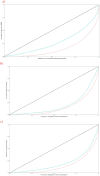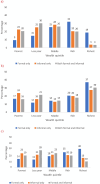Inequities in Household Out-Of-Pocket Spending Among Urban Slum Dwellers in Southeast Nigeria
- PMID: 40212065
- PMCID: PMC11981907
- DOI: 10.3389/ijph.2025.1607969
Inequities in Household Out-Of-Pocket Spending Among Urban Slum Dwellers in Southeast Nigeria
Abstract
Objectives: This study examines the economic burden and inequities in out-of-pocket expenditures (OOPEs) to access healthcare in urban slums in Nigeria.
Methods: The cross-sectional study was undertaken in eight urban slums in Enugu and Anambra, Nigeria. Participants (n = 1,025) responded to questions on health expenditures and access to healthcare. Gamma regression was used to estimate the mean differences in OOPE. Financing incidence analysis was used to estimate inequities in OOPE.
Results: Enugu residents and individuals with formal occupations incurred lower costs than the residents in Anambra and those employed in informal occupations. Households in the middle wealth quintile incurred higher costs than those in the poorest quintile. Gini, concentration, and Kakwani indices indicated a progressive financing system, with the richest contributing proportionately more than their share of ability to pay (ATP). Poorest households used informal healthcare more.
Conclusion: Although payment for healthcare in urban slums is progressive, the poorest households may be at risk of poor health outcomes due to reliance on informal healthcare providers. Our findings highlight the role ATP may play in healthcare denial among the urban poor.
Keywords: Kakwani index; ability to pay; inequity; out-of-pocket expenditure; urban slum.
Copyright © 2025 Ozor, Nwokolo, Teixeira de Siqueira Filha, Odii, Hicks, Li, Ezenwaka, Dawkins and Onwujekwe.
Conflict of interest statement
The authors declare that they do not have any conflicts of interest.
Figures


Similar articles
-
Does equity in healthcare spending exist among Indian states? Explaining regional variations from national sample survey data.Int J Equity Health. 2017 Jan 14;16(1):15. doi: 10.1186/s12939-017-0517-y. Int J Equity Health. 2017. PMID: 28088198 Free PMC article.
-
Financing incidence analysis of household out-of-pocket spending for healthcare: getting more health for money in Nigeria?Int J Health Plann Manage. 2014 Apr-Jun;29(2):e174-85. doi: 10.1002/hpm.2166. Epub 2013 Feb 7. Int J Health Plann Manage. 2014. PMID: 23390079
-
Maternal and neonatal health expenditure in Mumbai slums (India): a cross sectional study.BMC Public Health. 2011 Mar 8;11:150. doi: 10.1186/1471-2458-11-150. BMC Public Health. 2011. PMID: 21385404 Free PMC article.
-
The Financial Burden of Non-Communicable Chronic Diseases in Rural Nigeria: Wealth and Gender Heterogeneity in Health Care Utilization and Health Expenditures.PLoS One. 2016 Nov 10;11(11):e0166121. doi: 10.1371/journal.pone.0166121. eCollection 2016. PLoS One. 2016. PMID: 27832107 Free PMC article.
-
The economics of healthcare access: a scoping review on the economic impact of healthcare access for vulnerable urban populations in low- and middle-income countries.Int J Equity Health. 2022 Dec 31;21(1):191. doi: 10.1186/s12939-022-01804-3. Int J Equity Health. 2022. PMID: 36585704 Free PMC article.
References
-
- Bayati M, Mehrolhassani MH, Yazdi-Feyzabadi V. A Paradoxical Situation in Regressivity or Progressivity of Out of Pocket Payment for Health Care: Which One Is a Matter of the Health Policy Maker’s Decision to Intervention? Cost Effectiveness and Resource Allocation (2019) 17(1):28. 10.1186/s12962-019-0197-0 - DOI - PMC - PubMed
MeSH terms
LinkOut - more resources
Full Text Sources
Medical

